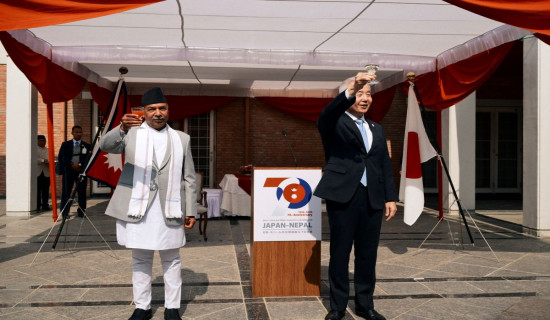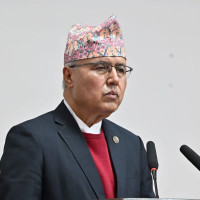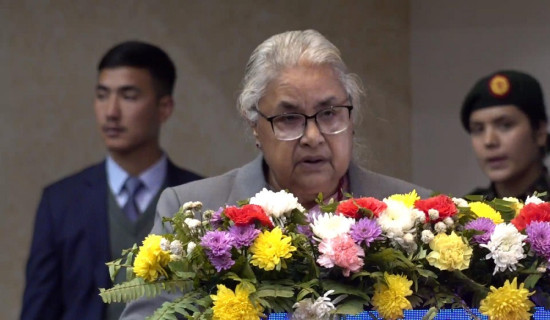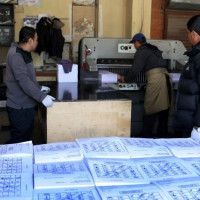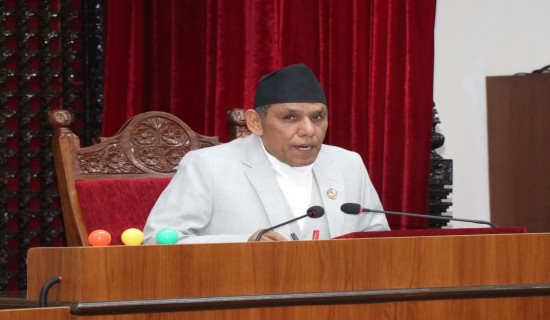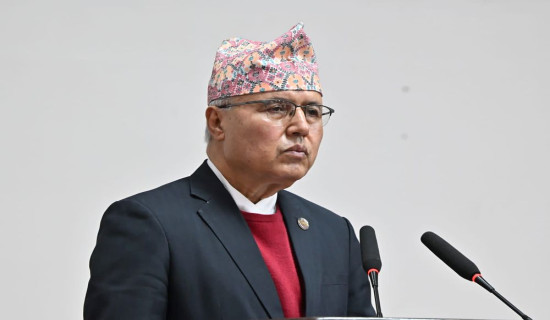- Thursday, 12 February 2026
News Commentary: As AI ecosystem overwhelms world, Nepal needs to augment pace
By Narayan Prasad Ghimire, Kathmandu, April 1: If there are two most defining topics in the world at present, climate change and artificial intelligence (AI) undoubtedly come on top. The explosive rollout of generative AI in 2023 is a critical juncture in the development of information technology.
In a short period, thousands of seminars have been organized while research papers in similar numbers written on this hottest topic. With both extremes showing the positive impacts and downsides of AI in the literature and lectures, the bewilderment has overwhelmed the global populace. Techno optimism with futurist rallying and pessimism with trepidation of hijacking of humanity is going on regarding AI.
Although the world witnessed an explosion of generative AI in 2023, the AI spurt did not come as a bolt from blue.
AI: A long debate, continuous evolution
It was October 27, 1960, when an American newspaper the 'Lexington Leader' ran a headline, 'IBM Experts Say Electronic Brains Offer No Threat to Taking Over Man's World'. Giving credit to the AP, the paper in Frank Carey's byline from Washington: "If you have nightmares about electronic brains getting out of control and taking over the world, you can rest easy. An IBM (International Business Machines) expert says they're no threat to mankind. However, he also says scientists are trying to cook up something new a machine that would really imitate the operation of the brain and nervous system of animals, or even a human."
The news story had brought a reference that IBM man Arthur L Samuel had a dispute with Dr Norbert Wiener, an MIT (Massachusetts Institute of Technology) expert and originator of the science of Cybernetics, over computers and their potential to that of human brains.
The story stated fear and hope even among the earliest computer scientists, who are regarded as AI pioneers, over computer capability. This scribe found it in a truncated piece of Lexington Leader newspaper, which was shared by Luciano Floridi, Founding Director of the Digital Ethics Centre at Yale University, on X (former Twitter) on March 14.
Since then to the present, the IT sector has come a long way. The unwavering research by computer and data scientists continued to add new dimensions to this field. Consequently, the world is in the later stage of the fourth industrial revolution (4IR) at present. Digital gadgets are as if human appendages, while the internet is an oxygen of communications and AI a byword and a force multiplier. Nothing is being left untouched by the AI debate as had been the case about digital disruption some years back. IT and AI talks are not merely the geeks' business.
AI: Fear and hope
Economic correspondent for the Guardian, Richard Partington, on March 27, wrote a story on how AI could eat up millions of jobs in the UK. Giving a headline, 'AI ‘apocalypse’ could take away almost 8 million jobs in the UK, says report', he referenced a report of the Institute for Public Policy Research (IPPR) which warned that women, younger workers and those on lower wages are facing the utmost threat of automation. It is so in the wake of several companies increasingly embracing generative AI technologies so that they can automate workplace chores.
On the other hand, the Times of India released a video story on March 10 about India’s first-ever AI teacher robot named ‘Iris’ which was rolled out in a Kerala school. The story read: Powered by cutting-edge robotics and generative AI technology, Iris features an in-built voice assistant and runs on an Intel chipset. The humanoid, clad in a saree, interacted with students in a video shared on Instagram.
"Developed under the Atal Tinkering Lab (ATL) project by NITI Aayog, Iris aims to revolutionize traditional teaching, responding to queries and educating students from nursery to class 12 through an Android app," it said, adding, "Currently proficient in three languages, developers plan to extend its language capabilities to 20 languages."
UN resolution on AI
The above references are only just representative stories. There are thousands of such stories showcasing both the bright and dark sides of AI in the world. The vehement emergence of AI and its pervasive expansion has compelled the world to think and act collectively. National and regional concerns are shown in abundant AI-related policies, directives and research. Lately, regulation and governance of AI have therefore been a pressing issue.
In this regard, the UN General Assembly adopted a resolution for safe, secure and trustworthy AI on March 21. The 78th session of the UNGA adopted the resolution, underlining the need for human-centric AI which fully respects, promotes and protects human rights and international law, maintains privacy, and enables progress towards SDGs and sustainable development in three fronts- economic, social and environmental.
The UN member states are encouraged to prepare policies and regulations to foster competition in safe, secure and trustworthy AI systems and technologies associated with it. The UN has also urged all member states to take action for cooperation and extend assistance to developing countries so that they could be ensured inclusive and equitable access to reap benefits from digital transformation and AI systems.
AI readiness: Where we are
While mentioning AI adoption, it is worth noting to observe Nepal's status on AI readiness. Nepal has been ranked 150th out of 193 countries in the Government AI Readiness Index, 2023. The report made public by Oxford Insights showed Nepal's total score- 30.77. The total score is calculated from three bases- the government pillar, the technology sector pillar, and the data and infrastructure pillars. With a total score, of 30.77, Nepal has achieved 31.04 in the government pillar, 24.21 in the technology sector pillar, and 37.06 in the data and infrastructure pillar.
The US is on top with an 84.80 total score, while Singapore is second in the index with an 81.97 total score.
Earlier in 2022, Nepal had secured 139th position out of 181 countries in the Government AI Readiness Index.
This data indicates the Nepal government's strength in the latest technology and the areas it should improve to embrace and prosper AI. It warrants attention and engagement from the government and private sectors to boost their capacity and visibility.
In this regard, in an AI Conference held in the federal capital, Kathmandu, on March 3, Prime Minister Pushpa Kamal Dahal 'Prachanda' vowed the creation of a favorable atmosphere for the development and promotion of IT and artificial intelligence.
The RSS had reported PM Dahal saying, "The government will take the necessary initiatives that it needs to take from its side for the development of computer technology, robotic technology, data science, machine learning, internet of things and computational infrastructures. It will move ahead coordinating the policy related to AI with the National Science and Technology and Innovation Policy, 2076 BS and the Digital Nepal Framework, 2019."
Similarly, the Ministry of Communications and Information Technology recently released a draft bill on IT and Cybersecurity, which has stated AI, but it is meager. Interestingly, it has urged everyone against the negative use of AI while failing to define what AI is. The government is learned to be mulling a separate AI policy as well.
Welcome initiative
It is welcome in deed for Nepal that even internationally acclaimed AI scientists are conducting research and imparting education on AI to Nepali and international scholars within the country itself.
Talking to this scribe earlier, the Director at Nepal Applied Mathematics and Informatics Institute (NAAMII), Dr Bishesh Khanal, had informed that they had conducted four editions of AI camps/schools in which the AI students and students of data science from more than 30 countries had participated. NAAMII based in Nepal is an organization run by youth scientists, which has been catering knowledge and skills even to foreign scholars- doing PhD in data, robotics and AI through summer, winter and spring schools. The story of Fusemachines about AI is also appreciated in Nepal.
These international and national events and stories prove that the AI atmosphere and ecosystem have already engulfed us. Expansion of AI is unstoppable. Nepal should not shy away but needs to join the bandwagon.
For this to happen, massive literacy of AI is imperative. The government, line agencies and experts' organizations can collaborate to devise a model of AI literacy and transfer skills and knowledge accordingly. Similarly, the government needs to identify the AI activities going on in the country and recognize the organizations and research institutions that are championing AI practices.
At a time when the Head of the Government is pledging for the atmosphere to progress IT and AI, the concerned government agencies' active engagement with the youths' innovative initiative counts much to harness the benefit of IT and AI. The young scientists need the State's cooperative role to augment research and innovation in IT- whether it is to break legal barriers or to roll out modern policy, facilitate the organizational activities and set up institutional mechanisms equipping with a high-tech workforce.
Importantly, investment in research and development of IT is a long due in Nepal. It is the right time for the government is discuss budget priorities for the next year. So, line ministries and concerned agencies can pile up pressure for adequate budget allocation on this front. (RSS)



